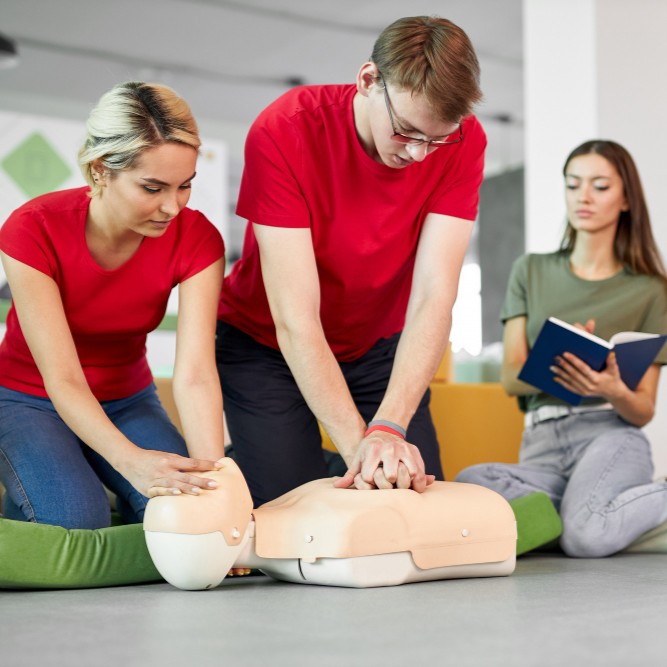BASIC LIFE SUPPORT TRAINING (BLS) AHA

Send Enquiry
Comprehensive Basic Life Support Training (BLS)
Explore the world of Basic Life Support (BLS) with the CNA Training center, where our intensive course is tailored to elevate healthcare professionals’ life-saving abilities.
Basic Life Support fundamentals at CNA Training Center, Dubai
Welcome to CNA Training Center, your dedicated partner in advancing your skills in Basic Life Support (BLS). Our intensive BLS course is meticulously designed to equip healthcare professionals with the knowledge and confidence to effectively manage medical emergencies. Recognizing the importance of up-to-date standards, our curriculum is inspired by the American Safety and Health Institute (ASHI) and aligns with global guidelines, including those of MOH, HAAD, DHA, and DCAS.
Basic Life Support (BLS): Saving Lives through learned Life-saving Skills
Basic Life Support (BLS) refers to critical set of skills that play a significant role in emergency situations. Such life-saving skills can be supportive to individuals experiencing cardiac arrest, respiratory failure, or other life-threatening emergencies.
BLS knowledge and proficiency are essential for saving lives, regardless of whether you work in healthcare, are a first responder, or are just trying to be prepared to deal with emergencies.
BLS techniques are intended to keep the patient’s blood flowing to the brain and oxygenated until more advanced medical assistance can be provided.
What You Will Learn: Basic Life Support Course Highlights
Our BLS course delves deep into various critical scenarios, ensuring participants are adept in handling a spectrum of emergencies:
BLS Comprises of:
Recognition of Signs of Cardiac Arrest:
Learn how to Recognize the indicators of cardiac arrest and the importance of timely action.
Cardiopulmonary Resuscitation (CPR):
CPR includes Developing the right technique for rescue breathing and chest compressions and understanding the significance of early initiation and continuous chest compressions.
Automated External Defibrillator (AED)
You will Gain knowledge of AED operation to respond promptly to cardiac emergencies including ability to correctly identify and attach AED pads.
Airway Management:
In airway management you will Learn how to open the airway and ensure proper breathing. Furthermore, you will acquire techniques for clearing airway obstructions in conscious and unconscious individuals.
BLS is a valuable skill for various individuals, including:
- Doctors, nurses, paramedics, and other healthcare professionals.
- First responders (emergency medical technicians, police officers, and firefighters).
- The general public (including educators, parents, and members of the community).
At the CNA Training Center, we offer Basic Life Support courses at both individuals and group/corporate levels. Courses are conducted fully in person as well as hybrid Simulation Learning programs that combine online coursework with hands-on practice in a classroom setting.
At the CNA Training Center, we offer Basic Life Support courses at both individuals and group/corporate levels. Courses are conducted fully in person as well as hybrid Simulation Learning programs that combine online coursework with hands-on practice in a classroom setting. we also cover Child and Infant CPR with choking
Course Outcome
The Basic Life Support (BLS) course provided by the American Heart Association (AHA) is designed to equip healthcare providers with essential skills for managing emergencies in various settings. Upon completion of the BLS AHA course, participants will:
Understand the Chain of Survival:
Gain knowledge of the critical steps in the Chain of Survival, including early recognition and activation of emergency response, early CPR, rapid defibrillation, and integrated post-cardiac arrest care.
Perform High-Quality CPR:
Learn how to deliver high-quality cardiopulmonary resuscitation (CPR) for adults, children, and infants, including chest compressions, rescue breathing, and the use of barrier devices.
Use an AED:
Become proficient in the use of an Automated External Defibrillator (AED) for defibrillation in cardiac arrest situations.
Provide Effective Ventilations:
Understand and practice the techniques for delivering effective ventilations using a bag-mask device and other airway management tools.
Recognize and Respond to Choking:
Learn the steps to identify and provide immediate care for choking in adults, children, and infants.
Team Dynamics:
Understand the principles of team dynamics in a resuscitation scenario, including communication, roles, and responsibilities within a team.
Certification:
Receive an AHA BLS Provider certification, valid for two years, which is recognized globally and is a requirement for many healthcare-related roles.
This course is crucial for healthcare professionals, including doctors, nurses, paramedics, and others who may need to respond to life-threatening emergencies.


